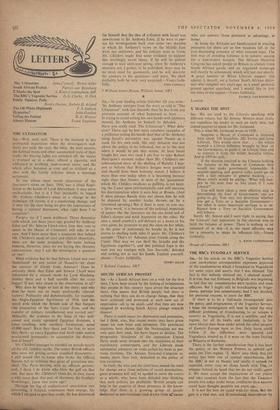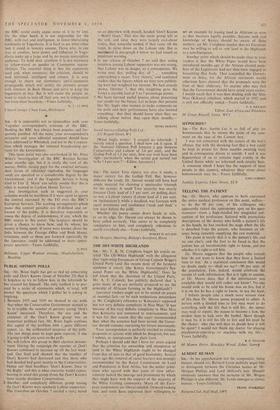THE BBC's YUGOSLAV SERVICE
SIR,--In his attack on the BBC's Yugoslav, Service your anonymous correspondent expresses approval of the commentaries which I broadcast to Yugoslavia for some years and asserts that I was silenced. The fact is that nobody silenced me. I silenced mysell. It is true that our Embassy in Belgrade was beginning to feel that my commentaries were tactless and even officious. But I might still be broadcasting to Yugo- slavia, perhaps less censoriously, had I not decided, for personal reasons, to leave the BBC.
If there is to he a 'full-scale investigation' into the policy and programmes of the Yugoslav Service, I hope the investigators will bear in mind the very difficult problems of broadcasting to so unique a country as Yugoslavia. It is not a satellite; and the regime, for all its faults and limitations, is far more liberal than those under which the other peoples of Eastern Europe have to live. Only harm could follow if the difference were ignored, and Yugoslavia treated as if it were on the same footing as Bulgaria or Rumania.
There is the further consideration that it has been the policy of the Western Powers to uphold and assist the Tito regime. 'Z. Marn' may think that the policy has been one of cynical opportunism. But the BBC is not to blame; and surely it cannot he expected, every time we shake hands with Tit, to whisper behind its hand that we do not really }A ea n it. We must accept the implications of our :•:olicy and take comfort from the fact that the Yugoslav people live today under better conditions than anyone could have thought possible ten years agt..
It is not the best we could wish for them, kut the gain is a real one; and ill-considered intervention by
the BBC could easily cause some of it to be lost. On the other hand, it is not impossible for the BBC, with tact and intelligence, to foster liberalising tendencies in Yugoslavia. It is hard to see what other task it could in honesty assume. Those who, in one way or another, have power and influence in Yugo- slavia make up a large and by no means unreceptive audience. To hold their attention it is not necessary to fellow-travel or pander to Communist suscep- tibilities. The essential thing is that the arguments used and, when necessary, the criticism, should be well informed, intelligent and sincere. It is easy enough to churn out elementary anti-Communist propaganda which will satisfy the pressure groups with interests in Bush House and serve to keep the inquisitors at bay. But it will cause the people we want to reach to turn off their sets, not in indignation but from sheer boredom.—Yours faithfully.
D. I.. CLARKE Chase Cottage, Chase Lane, Haslentere







































 Previous page
Previous page